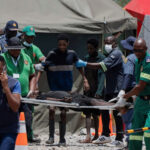The political atmosphere in Zimbabwe is heating up, with Zanu PF provincial structures across the country endorsing President Emmerson Mnangagwa’s continued leadership beyond his constitutionally mandated two terms, which end in 2028.
This move, which is being framed as a response to the “wishes of the people,” has sparked a firestorm of controversy and raised serious concerns about the future of Zimbabwe’s democracy.
The clamour for Mnangagwa to remain in power beyond the two-term limit has emanated from Zanu PF’s provincial structures, a clear indication that the party’s internal dynamics are far from settled.
The endorsement by the provinces will be tabled at the Zanu PF national people’s conference in Bulawayo next month, where party wings including the women’s league and youth league will also be pushing for Mnangagwa’s continued leadership. They argue that his continued governance is essential for the country’s stability and development.
During a PCC meeting in Manicaland last week, Zanu PF members unanimously endorsed Mnangagwa’s leadership beyond 2028. Zanu PF national political commissar Munyaradzi Machacha, while acknowledging that not everyone might agree with the resolutions, defended the process as democratic, Newsday has reported.
“Isn’t this is what you term democracy. If we keep quiet then you will say there is no democracy. And if others speak you question them. So here it’s the people who are talking and the President listens to the wishes of his people, ndozviripo,” Machacha said.
“The people are very much aware of the Constitution, but they also desire the continuation of his leadership. So it’s now up to him to make the final decision. But just know that democracy doesn’t please everyone, but that’s democracy at work,” he added.
Similar resolutions have also been passed in other provinces, including Matabeleland South, with the Women’s League led by political commissar Maybe Mbowa echoing the call for Mnangagwa to extend his rule. The league’s national secretary Mabel Chinomona, committed to communicating the sentiments to Mnangagwa, describing him as a “listening President” who values the voice of the people.
Close sources within the party also said the party was intensifying efforts to secure a continued leadership role for Mnangagwa.
“Party insiders are adamant that Mnangagwa remains the cornerstone of our strategy moving forward. We are actively working on solidifying his position and ensuring a continued leadership role, both within Zanu PF and on the national level,” one source said.
Another source within the party said: “So we are going to have the conference next month with all the resolutions. The resolutions will be tabled at the conference and the President will just be a participant.”
These resolutions have, however, sparked widespread debate with political analysts saying they undermine the country’s Constitution and set a dangerous precedent for future leaders. Earlier last week, Zanu PF apparatchiks were reported to be pushing for the mutilation of the Constitution to facilitate the extension of Mnangagwa’s tenure beyond the constitutionally-mandated five-year two-term limit which ends in 2028.
However, Mnangagwa’s ambition to extend his term beyond 2028 faces a formidable obstacle: the Zimbabwean military. Despite his public pronouncements of upholding constitutionalism, the military, a key player in Zimbabwean politics, appears poised to block any attempts to prolong his presidency.
This defiance comes as Mnangagwa navigates a complex internal power struggle with his Vice-President, Constantino Chiwenga, a key figure in the 2017 coup that brought Mnangagwa to power. The battle for control over state resources and political influence is intensifying, with the military’s stance adding another layer of complexity to the already tense situation.
The Citizens for Coalition Change (CCC) party, a key opposition force, has vowed to launch an anti-Constitution amendment campaign to thwart the move.
“We are totally opposed to the amendment of the Constitution. It is undemocratic and against the spirit of constitutionalism. In any event, any amendment to the Constitution will require a referendum and the citizens are ready to embarrass them,” said CCC spokesperson Promise Mkwananzi.
The CCC’s stance is echoed by other opposition groups and civil society organisations. The Crisis in Zimbabwe Coalition has pledged to exhaust all legal channels to stop Zanu PF from amending the Constitution.
The clamour for Mnangagwa to remain in power beyond the constitutionally mandated two terms has ignited a firestorm of controversy and raised serious concerns about the future of Zimbabwe’s democracy. Political analysts have warned that such a move would be a blatant disregard for the Constitution and could trigger a cascade of unforeseen consequences, potentially leading to internal rebellion, a possible coup, and widespread unrest.
“Zanu PF has never respected the Constitution. So because Tshabangu gave them two-thirds in Parliament, they will tinker around with the two-term clause. If that happens, the consequences will be tectonic,” declared political analyst Rejoice Ngwenya.
Ngwenya painted a picture of the potential fallout, outlining a scenario that could plunge Zimbabwe into a vortex of political chaos:
As if that was not enough, outspoken Zanu PF politburo member Tshinga Dube last week once again waded into the sensitive issue of presidential succession, this time indirectly cautioning President Emmerson Mnangagwa against seeking a third term in office.
Dube, a decorated liberation war veteran, expressed his concerns during the burial of fellow war hero Killion Dube, who passed away on August 25th at the age of 89.
“There are various opinions on the succession issue. Most of the members in the party have said he should hang on to power, but he has said that he will follow the Constitution. Advisers are problematic, those advising him are only looking at things that benefit themselves only,” Tshinga Dube told mourners at the Lady Stanley cemetery on Sunday last week.
Dube, known for his forthrightness, expressed reservations about the advice being given to Mnangagwa, suggesting that some advisors are motivated by self-interest rather than the nation’s well-being.












